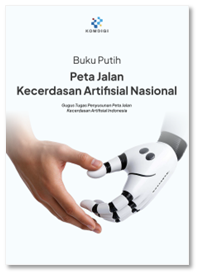August 25, 2025

Indonesia recently released its updated Artificial Intelligence Roadmap for public consultation. The public can access the document to understand the country’s direction on AI and provide feedback to it before August 29th. Proving to be more than a policy note, it is an open statement by KomDigi (Indonesia’s Ministry of Communication and Digital Affairs) that for AI development to take off in Indonesia it must be human-centric.

The roadmap recognizes that technology on its own does not build trust, nor does its inherent improvement in capability guarantee widespread adoption. What builds trust is experience: when people feel AI is working for them, not on them. This is why the document does not only speak about infrastructure or algorithms. It devotes an entire appendix to ethics through “Konsep Pedoman Etika Kecerdasan Artifisial” — outlining principles such as transparency, accountability, and human dignity.
This matters because AI adoption is often judged by flashy demos or large investments into pilot projects. Yet in practice, success depends on whether a student can trust an AI as a tutor, whether a patient consents to AI-powered diagnostics, or whether citizens believe chatbots can provide reliable answers, especially on critical livelihood domains.
At its core, the roadmap is a blueprint for how Indonesia intends to harness AI. The document starts to define AI and its nuances (lifecycle, governance principles, risks). There is balance between ambition and pragmatism: setting a vision for global competitiveness while grounding it in priority use cases like healthcare, education, and public services.
The prioritized use cases and government strategy are grounded based on Indonesia’s current condition and global benchmarks, with analysis on each 8 building blocks of AI in ethics, policy, infrastructure and data, research, talent, investment, and use case.
For global readers, one insight stands out:
Indonesia is framing AI as a tool to enhance everyday experiences for its people, more than economic driver.
While many countries and companies seem to be at a race to adopt AI for economic or business growth, Indonesia remind us that it is ethics, or rather, human itself that give meaning — the rest is commentary. However, we are yet to see it unfolds.
The AI Roadmap, together with its Ethics Guideline, is designed as an open resource and guidelines to be a structure that individuals and institutions can use to anchor their own strategies.
For public institutions, the document provides clarity on where AI efforts are most encouraged:
For enterprises, the roadmap signals where demand may emerge first:
For startups and SMEs, the roadmap lowers the barrier to entry by highlighting areas where local context matters most:
For academia and civil society, the roadmap invites participation as independent partners:
For investors, the roadmap provides visibility on where policy attention and financing will likely converge:
Indonesia’s latest AI Roadmap is a step toward placing people, not technology, at the centre of economic progress in the era of AI The message is clear: AI must be trusted, safe, and meaningful to citizens if it is to succeed.
What we would like to see more of in the coming years is depth in execution:
Realistically, the ecosystem will mature if government, business, academia, and investors align around the same principle: AI should enhance life while safeguarding safety and trust. If this alignment continues, Indonesia will be beyond adopting AI, but shape it in a way that is inclusive, ethical, and globally competitive.
Connect to unlock exclusive insights, smart AI tools, and real connections that spark action.
Schedule a chat to unlock the full experience